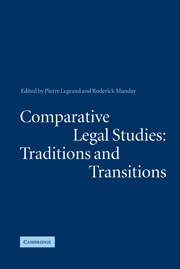Book contents
- Frontmatter
- Contents
- List of contributors
- Introduction
- Comparative legal studies and its legacies
- Comparative legal studies and its boundaries
- Comparative legal studies and its theories
- 8 The question of understanding
- 9 The same and the different
- 10 The neo-Romantic turn
- 11 The methods and the politics
- Comparative legal studies and its futures
- Conclusion
- Index
10 - The neo-Romantic turn
Published online by Cambridge University Press: 18 December 2009
- Frontmatter
- Contents
- List of contributors
- Introduction
- Comparative legal studies and its legacies
- Comparative legal studies and its boundaries
- Comparative legal studies and its theories
- 8 The question of understanding
- 9 The same and the different
- 10 The neo-Romantic turn
- 11 The methods and the politics
- Comparative legal studies and its futures
- Conclusion
- Index
Summary
If I begin by saying that many comparatists have recently taken a ‘neo-Romantic turn’, it may sound as though I am mounting an attack on the persons responsible. After all, the term ‘Romanticism’ can have some comical associations and some ugly ones as well. This paper is not by any means meant as an unqualified attack, however. I am more or less in favour of our new Romanticism. Nevertheless, it is my goal in this paper to voice some gentle doubts about the new literature.
That said, let me begin by observing that the last couple of years have indeed seen something of a neo-Romantic turn in the philosophy of comparative law. Some of this has involved a revival of the early Romantic philosophers themselves. In particular, the theories of Johann Gottfried Herder, late eighteenth-century philosopher of the Volksgeist, have been rediscovered by William Ewald. Some of it has involved later and more difficult representatives of the long Romantic tradition. Thus, a number of different scholars, most prominent among them Pierre Legrand, have revived a mess of ideas from the twentieth-century neo-Romantic tradition of hermeneutics – from the philosophical tradition that conceives interpretation as the enterprise of ‘understanding’ the ‘other’, of developing a sympathetic grasp of fundamentally alien cultures and other persons. Alongside Legrand, the names that should be mentioned here include notably those of Vivian Curran and Nora Demleitner; of the anthropologist Annelise Riles; and, from an older generation, that of Josef Esser as well.
- Type
- Chapter
- Information
- Comparative Legal Studies: Traditions and Transitions , pp. 312 - 344Publisher: Cambridge University PressPrint publication year: 2003
- 14
- Cited by

